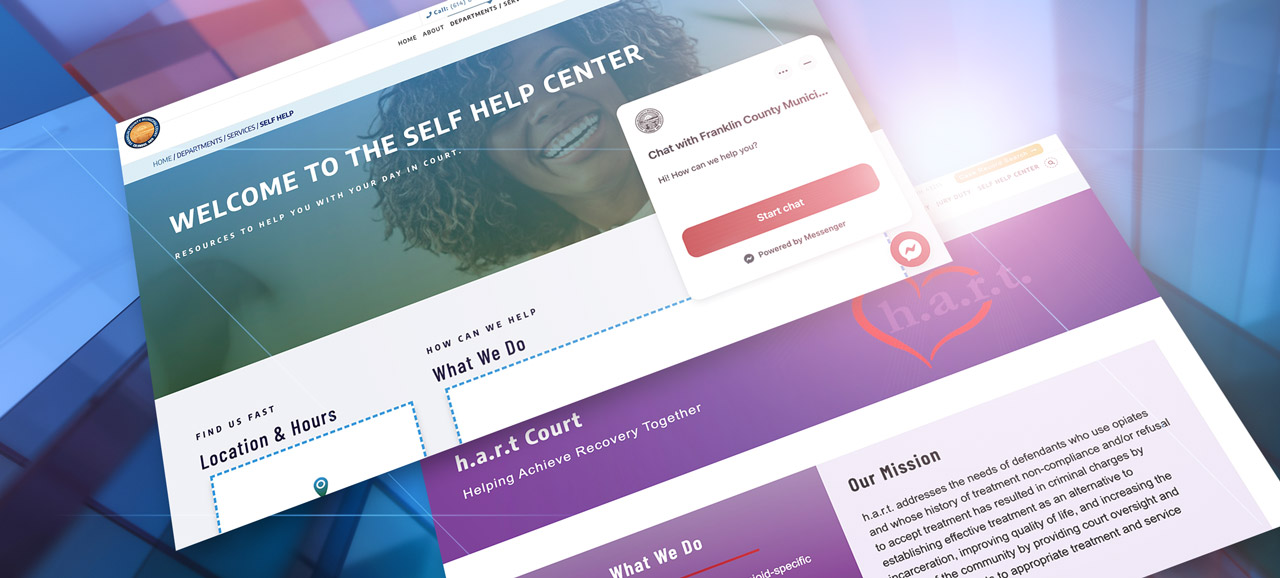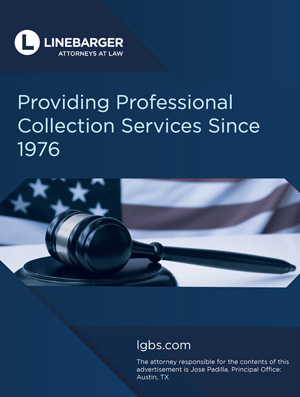In an era where justice and rehabilitation hold increasing importance, municipal courts shine as a beacon of hope and progress. Local courts go beyond traditional justice by addressing the root causes of criminal behavior, facilitating individuals’ rebuilding of their lives, and maintaining the community’s safety. This article delves into the innovative approach of the Franklin County Municipal Court in Columbus, Ohio, which includes self-help services, a full-service resource center with an opiate drop-in center, specialized dockets, and therapeutic sentencing alternatives.
The court has been fortunate to develop and grow each of the programs discussed here through a variety of grant-funded initiatives. This approach to court programming has several benefits: it drives court leaders to be data driven; engages national-level collaboration and technical assistance; and allows time for programs to be piloted, tested, and prepared for presentation to the court’s fiscal body for continued support beyond the grant cycle. Where applicable, these grant-funding strategies will also be discussed.
Empowering Through Self-Help Services
Central to the court’s approach is its comprehensive Self-Help Center and Dispute Resolution Department aiding self-represented individuals in navigating court processes such as criminal record sealing, landlord/tenant disputes, civil claims, and creditor/debtor issues. The center provides mediation services that may resolve legal matters before a case filing.
The center is arguably one of the busiest programs in the courthouse. In 2023 the center assisted over 29,000 visitors. The program has engaged eviction prevention coordinators to assist with Eviction Court and helped in facilitating community outreach, such as sealing-of-records events that served 700 people. The center’s managing attorney serves as co-chair of the Non-Lawyer Navigator work group for the Self-Represented Litigation Network and collaborates with state and local courts to assist in starting self-help resource centers.
The center’s social work program, supported by a project grant through the State Justice Institute and matching funds from the Franklin County Law Library, has been held out as a national best practice by the Self-Represented Litigation Network and by researchers that have studied non-lawyer services in state courts. This program embeds a licensed social worker within the center, who assists individuals in Eviction Court to connect with critical behavioral health and community resources.
The Self-Help Center is funded by a combination of grants, special project funds, and budgeted funding from the City of Columbus. Having originated during the peak of the COVID-19 public health crisis, the social work program proved its value time and again even as the pandemic waned. This component of the center was initially funded through a State Justice Institute project grant and has transitioned to receive support through the City of Columbus and American Rescue Plan Act funding, with the goal of permanency beyond 2025.
Combating the Opiate Crisis Through the MARCH Center
The Medically Assisted Treatment, Assessment, Resources, Collaboration, and Hope Center (MARCH) is a full-resource center, regardless of justice involvement, available to the entire community. MARCH collaborates with various community organizations and social service agencies to offer a wide range of services, such as addiction counseling, mental health support, food assistance, and assistance applying for cash and insurance. MARCH also provides linkage and enrollment into employment readiness and resource programs with onsite peer support navigators available to facilitate access to these resources.
This integration of support services within the court aims to offer individuals immediate access to vital resources when they need them the most. This approach encourages a holistic justice perspective, shifting from perpetuating cycles of ineffective and punitive measures to providing resources that can lead to rehabilitation and long-term reformation.
The devastating opioid epidemic has wreaked havoc across communities, leaving countless individuals struggling with addiction and its accompanying repercussions. Recognizing the urgency of this crisis, the Franklin County Municipal Court has established an onsite medication-assisted treatment drop-in center.
The MARCH Center provides a safe and supportive environment for those battling addiction to seek help without fear of judgment or reprisal. In addition to access to Vivitrol, the MARCH Center provides referrals for medical, alcohol, drug, and mental health counseling; bio/psycho/social assessments; screening; and residential treatment services and sober housing. Integrating this center within the court system demonstrates the court’s commitment to combating the opioid crisis and fostering a compassionate approach to dealing with drug-related offenses.
The MARCH Center has been supported by sequential Bureau of Justice Assistance COAP and COSSAP grants since its inception, with components gradually enveloped by the court’s general fund over time. The program is facilitated by four staff members, including a supervisor, two case managers, and a special programs coordinator. While the program is open to the public, two probation officers are also assigned to the program to support individuals under supervision who are engaged with its services.
Specialized Dockets: Tailored Justice for Unique Needs
The Franklin County Municipal Court has led the field in specialized dockets to address specific cases for a more effective justice system. The Specialized Docket Department links participants to behavioral health treatment providers, encourages independent recovery, sets individualized goals, and monitors personal progress while providing trauma-competent services and balancing accountability for criminal actions. All the Specialized Docket programs have been certified by the Supreme Court of Ohio and undergo recertification every three years. This allows courts to review their processes and procedures and ensure that they align and continue to evolve with best practices.
The mission of the Specialized Docket Department is to enhance public safety, rebuild lives, and reduce recidivism through restorative justice while providing accountability, community education, and support. The court’s specialized dockets include Helping Achieve Recovery Together (h.a.r.t.), a two-year, four-phase opioid-specific drug court giving defendants with a history of treatment refusal or noncompliance the opportunity to engage in addiction treatment. The Military and Veterans Services (MAVS) docket is structured to meet the needs of veterans who experience multiple interactions with the criminal justice system. The Learning to Identify and Navigate Change (L.I.N.C.) docket participants receive mental health and substance use treatment while working toward a more stable life. Recovery Court addresses the needs of defendants whose primary dependency on alcohol or non-opiate drugs results in criminal charges and low-level felonies. The CATCH Program (Creating Autonomy Through Collaborative Healing) exists to break the cycle of abuse for victims of human trafficking, prostitution, and sexual exploitation by providing resources, community, and accountability.
The department also facilitates participation in shorter engagement and education programs. CATCH 101 is designed to assist defendants charged with their first or second soliciting offense or other non-soliciting offenses and have been identified as being involved in the early stages of prostitution/sex trafficking. The presiding judge can often dismiss the offense after the offender successfully completes the classes. The Drug Education Program (DEP) offers participants the opportunity to have a low-level, drug-related felony charge plead down to a misdemeanor and upon successful completion of the program vacated and dismissed with the potential for sealing. This allows people with eligible felonies to avoid the felony charge on their record.
Having been established for over 20 years, most specialized dockets staff are supported by a combination of local, county, and state funding. However, programs have been supported by grants over the years as they sought to grow and evolve. The Bureau of Justice Assistance offers funding specific to drug courts, including veterans drug courts, which have assisted in adding and demonstrating the ongoing need for additional probation officers and services for participants. The LINC Program has received support through the Justice and Mental Health Collaboration Program in providing innovative programs. These funds have also supported critical improvements to the court’s case management system to ensure smooth communication and documentation for specialized dockets case management and supervision, as well as the translation of key documents in languages of significant volume and need.
Therapeutic Sentencing Alternatives: Healing over Punishment
The court’s innovative approach extends to therapeutic sentencing alternatives, emphasizing rehabilitation and personal growth over punitive measures. Alternatives encompass community service, restorative justice, drug court participation, mental health, and substance abuse treatment. These options empower individuals to address root causes, take accountability, and develop healthier coping mechanisms by facilitating successful reintegration into society.
Enhancing Community Education and Awareness
The court’s impact transcends its premises, striving to increase community understanding and support for those entangled in the justice system. Public outreach through partnerships, workshops, seminars, and awareness campaigns educates the public about addiction, mental health, and homelessness, reducing stigmatization and discrimination against individuals seeking recovery. This approach creates a support network that facilitates reintegration and reduces relapse into destructive behavior.
By increasing public understanding and empathy, the court aims to reduce stigmatization and discrimination against individuals struggling to better their situations. Community members are encouraged to become proactive stakeholders in rehabilitation by creating a support network that facilitates successful reintegration and improves the likelihood of successful outcomes.
Access to Essential Wrap-Around Services
Recognizing barriers to essential resources, the Franklin County Municipal Court proactively connects individuals with wrap-around services. Collaborating with community-based organizations, social service agencies, and charities, the court ensures access to housing, medical care, employment support, and family counseling. Customized to individual needs, access to these services aids in breaking the cycle of repeat offenses and offers genuine opportunities for transformation.
Conclusion
With their comprehensive services, municipal courts are in a position to set new standards for the justice system. Emphasizing rehabilitation, community collaboration, and individual growth, they address criminal behavior’s roots while providing necessary tools for transformation. Commonly referred to as “the people’s court,” municipal courts exemplify a justice system that values humanity and progress, inspires change, and guides other communities toward a more just and compassionate society. A brighter, more equitable future becomes attainable through collective effort and understanding to make our community safer.
The Franklin County Municipal Court’s website contains more information about the court, its services, and links to court forms.
ABOUT THE AUTHOR

Mary Kay Fenlon is a judge for the Franklin County Municipal Court. She can be contacted at Mary.FenIon@franklincountymunicourt.org.



